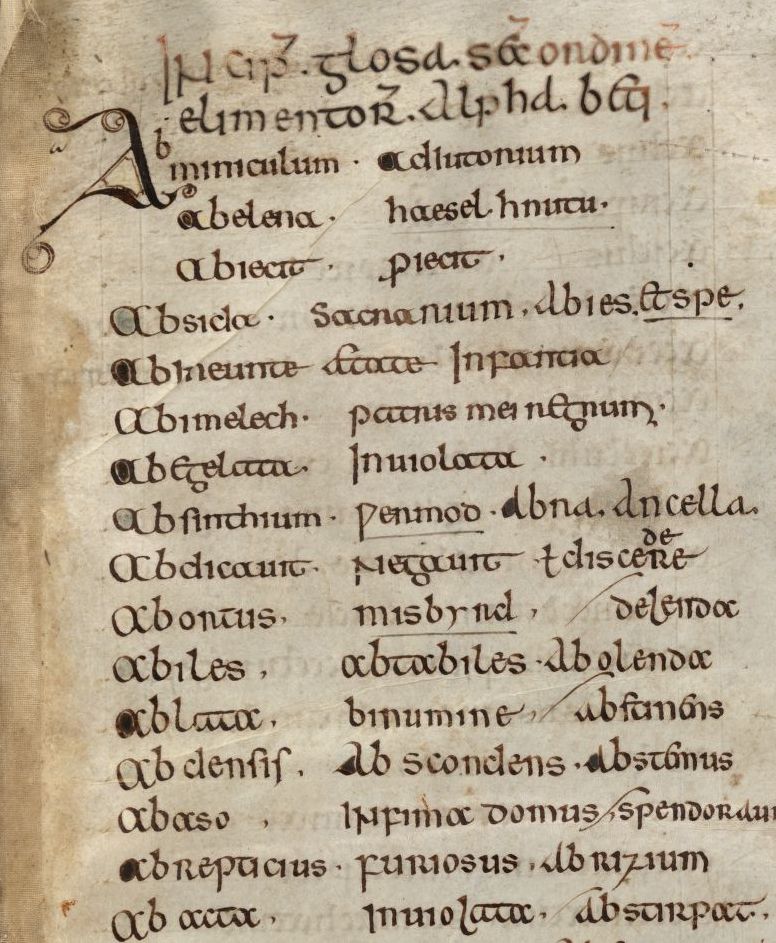Old Engli.sh
The Portal to the Language of the Anglo-Saxons
Read another, randomly chosen, past Old-Engli.sh News article:
Dictionary of Old English One Third Complete: The 2015 Progress Report
April 2016
December 2020
Loving the Letter L: The Dictionary of Old English Progress Report 2019
The annual progress report of the Dictionary of Old English (DOE) for 2019 is out, and the developments at the project are as inspiring and innovative as ever. Work is progressing on the letter L and the DOE website now hosts a brand-new edition of the Épinal-Erfurt Glossary. |  A page from the Épinal-Erfurt Glossary (CCCC 144) - the DOE is now hosting a free online edition of this document |
The Dictionary of Old English (DOE), the world's largest project on the Anglo-Saxon language, has published its latest progress report. The dictionary continues its steady work towards publication of all the words recorded during the Old English era, and surprises its fans with new features and discoveries.
The editors of the DOE are currently focusing on words beginning with L, a letter so frequent that it will eventually be published in two separate installments. The entries for some of the most difficult words have already been completed, lǣdan 'to lead' or lǣwede 'lay, non-clerical,' for instance. Yet, challenging work still lies ahead of the team for other words, including land, the most common item for L with more than 5,000 tokens, or the famous interjection lā 'lo, behold.'
The progress report speaks of new features incorporated into the project. The DOE Corpus is occasionally updated so that its texts are based on the best currently available critical editions. One such update is underway at the moment – some charters will be replaced with the excellent Anglo-Saxon Charters Series published by the British Academy. The DOE is also involved in the creation of editions itself. It currently aids in the publication of a complete edition of the Épinal-Erfurt Glossary, a seventh century Latin-English glossary, and one of the most important witnesses of the earliest form of Old English. What is special about this edition? Get this, the Épinal-Erfurt Glossary can be accessed by everyone for free directly from the DOE website as new entries are gradually made available.
Last but not least, the DOE announces that Rachel Fletcher, a visiting researcher from the University of Glasgow, has found some amazing documents in a collection of materials from the early days of the Oxford English Dictionary (OED) during the time of her stay. Among those are dozens of word quotation slips written or annotated by J.R.R. Tolkien – a truly sensational discovery!
2019 has once again proven the DOE to be a lexicographic institution of the highest caliber. Whatever resources and innovations will they come up with next year?
The editors of the DOE are currently focusing on words beginning with L, a letter so frequent that it will eventually be published in two separate installments. The entries for some of the most difficult words have already been completed, lǣdan 'to lead' or lǣwede 'lay, non-clerical,' for instance. Yet, challenging work still lies ahead of the team for other words, including land, the most common item for L with more than 5,000 tokens, or the famous interjection lā 'lo, behold.'
The progress report speaks of new features incorporated into the project. The DOE Corpus is occasionally updated so that its texts are based on the best currently available critical editions. One such update is underway at the moment – some charters will be replaced with the excellent Anglo-Saxon Charters Series published by the British Academy. The DOE is also involved in the creation of editions itself. It currently aids in the publication of a complete edition of the Épinal-Erfurt Glossary, a seventh century Latin-English glossary, and one of the most important witnesses of the earliest form of Old English. What is special about this edition? Get this, the Épinal-Erfurt Glossary can be accessed by everyone for free directly from the DOE website as new entries are gradually made available.
Last but not least, the DOE announces that Rachel Fletcher, a visiting researcher from the University of Glasgow, has found some amazing documents in a collection of materials from the early days of the Oxford English Dictionary (OED) during the time of her stay. Among those are dozens of word quotation slips written or annotated by J.R.R. Tolkien – a truly sensational discovery!
2019 has once again proven the DOE to be a lexicographic institution of the highest caliber. Whatever resources and innovations will they come up with next year?
- Find more OE news at www.oenewsletter.org
- Read the full Dictionary of Old English 2019 Progress Report